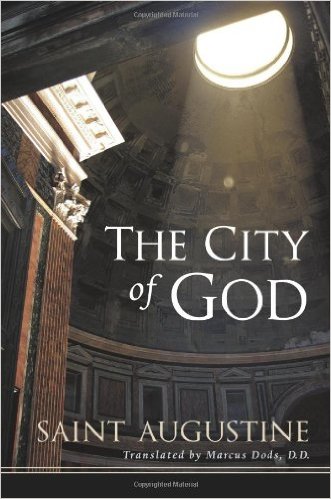
The City of God – The Preface
As was (and still largely is) customary for a work like this, Augustine starts by outlining his intention for what he admits is his “great work”. And even in the all-so-brief preface (in my version it’s only about 200 words or so), Augustine manages to pack a lot in!
Ostensibly, he is writing a defence of what he calls the “city of God” against the pagans; those who “prefer their own gods to the Founder of this city”. He is attempting to “persuade the proud how great is the virtue of humility” – the City of God is simultaneously apologetic and evangelistic.
One of the things that struck me from the preface was the breadth of Augustine’s term “city of God”, and I’m currently pondering the relationship between the city of God and the Kingdom of God. The Psalms (46:4, 48:1ff, 87:3, also implied in 101:7-8) use the term to refer to Zion, the centre of God’s rule, specifically of the Davidic kingdom centred in Jerusalem. In the New Testament (where it is clear that the kind of earthly kingdom some were anticipating in light of the Old Testament wasn’t God’s plan), the metaphor refers to the heavenly Jerusalem, the eternal rule of God in the new creation (Heb 10:16, Heb 12:22, also Rev 3:12 and Rev 21). So even though it’s not language that I’m accustomed to using, the Scriptures use “city of God” as at least a rough equivalent of the “kingdom of God”. I’m wary of making too much of the reference, however, especially thinking about how we consider the ‘city of God’ in this age, between the comings of Jesus. This is another mental sticky-note to come back to later…
And so I guess the thing I’m looking out for as I continue throughout the City of God is just how Augustine treats these separate manifestations, or maybe we could call them ‘suburbs’ of the divine city – that which “still lives by faith in this fleeting course of time, and sojourns in the midst of the ungodly” (sometimes referred to as the ‘church militant’), as well as that which “shall dwell in the fixed stability of its eternal seat… and obtain… final victory and perfect peace” (correspondingly called the ‘church triumphant’). How ought the kingdom (or city) of God behave here and now, while awaiting that final victory and peace? How ought it relate to the earthly city? These are all things I’ve thought briefly about before, but will in time cover in more detail as Augustine gets there.
Augustine finishes his preface with an intriguing, and I think accurate, assertion: “we must speak also of the earthly city, which, though it be mistress of the nations, is itself ruled by its lust of rule” (my emphasis). Particularly here in Italy, where political corruption is the norm, and where the intersection of church and state has had dire results for both, this seems like a particularly relevant assertion. Italians seem to expect corruption from their politicians and others in authority, in a way that I’m yet to really encounter but have been told to be prepared for. It seems to me that one of the cultural avenues for the gospel here is in fact the city of God, where truth, justice and equity reign – where good is rewarded and evil punished. And yet the gospel also speaks of grace, of the forgiveness of evil – this, too, is a message that is sadly foreign to many Italians and yet would be so sweet to their ears should they hear and understand it! As Augustine says here, it is grace and not “human arrogance” that “raises us… above all earthly dignitaries”. Quite what Augustine means by ‘grace’ is a discussion for another time, but I anticipate that we’ll get there.
Alright, time to make our first forays into the city proper! See you next post.